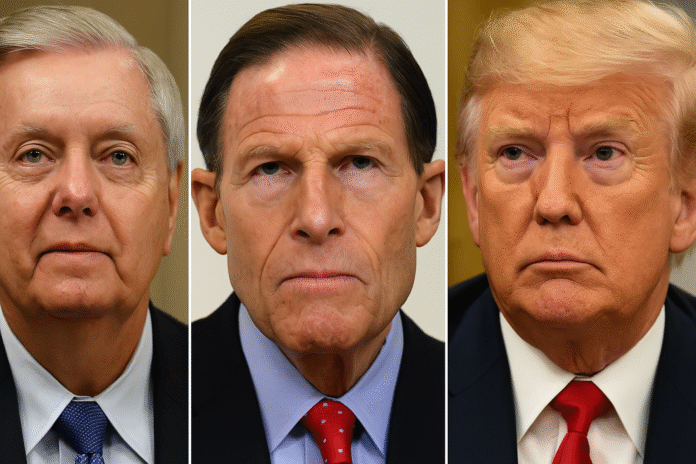In April 2025, Senators Lindsey Graham (Republican) and Richard Blumenthal (Democrat) introduced the Sanctioning Russia Act of 2025. This bipartisan bill threatens to impose up to 500% import tariffs on goods from countries that continue to purchase Russian oil, gas, petrochemicals, or uranium.
“Economic Bunker-Buster” for India and China
The bill, led by Republican Senator Lindsey Graham, has 84 co-sponsors, giving it overwhelming support in the US Senate. Graham described it as an “economic bunker-buster” targeting Russia, India, and China.
“If you continue to prop up Putin’s war machine, you’ll have nobody to blame but yourself,” Graham warned India and China.
He added in an interview with NBC: “This bill is going to pass. We’re going to give the president a waiver. It’ll be a tool in his toolbox to bring Putin to the table.”
Despite the support, the Trump administration is resisting the bill, arguing that extreme economic pressure on India could undermine US diplomatic efforts in West Asia and hurt America’s strategic partnerships.
India’s Delicate Position: Partner and Target
India presents a unique challenge for the US:
-
It is a key strategic ally in the Indo-Pacific region.
-
It is also the largest supplier of generic pharmaceuticals to the US, including life-saving and essential medicines.
-
Any tariff spike could disrupt healthcare access and trade balance in the US itself.
India has maintained a non-aligned position in the Russia-Ukraine war, opting for economic pragmatism by importing discounted Russian oil. While this helps control India’s inflation and energy costs, it places it at odds with US-led sanctions.
Economic Fallout for India?
If the bill becomes law without exemptions, India could face:
-
Up to 500% import tariffs on its exports to the US (e.g., pharmaceuticals, textiles, electronics).
-
Reduced demand for Indian goods due to higher prices in the American market.
-
Strain in India-US ties at a time when both nations are building closer defence and tech partnerships.
However, analysts believe that a presidential waiver clause—as mentioned by Senator Graham—might give the White House the flexibility to delay or soften the impact on key partners like India.
What Next?
-
The bill has not yet become law.
-
The White House may try to dilute or delay its provisions.
-
India is expected to engage diplomatically to secure exemptions or waivers, citing its critical trade role and strategic value.








